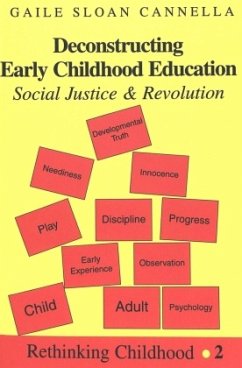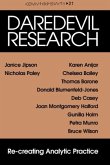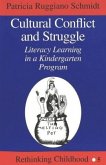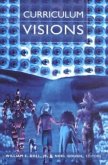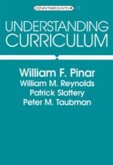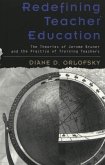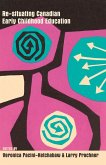From a critical perspective, some early childhood educators have proposed that the knowledge base used to ground the field actually serves to support the status quo, reinforces prejudices and stereotypes, and ignores the real lives of children. The purpose of this book is to deconstruct early childhood education, identifying and evaluating the themes and forms of discourse that have dominated the field, leading to the construction of specific theories and forms of practice that privilege particular groups of children and adults and oppress others. An alternative avenue for early childhood education is posited that focuses on social justice and human agency.
«Can there be a more important scholar in early childhood education? Gaile Sloan Cannella has indeed reconceptualized the field! No scholar, no student can proceed from this moment on without first grappling with what Dr. Cannella has written in this paradigmatic work. Congratulations to Gaile Cannella and congratulations to the field!» (William F. Pinar, St. Bernard Parish Alumni Endowed Professor, Louisiana State University)
«'Deconstructing Early Childhood Education: Social Justice and Revolution' represents an important moment in the larger revolution of childhood studies. Along with a cadre of other pioneers, Cannella refuses to accept traditional notions of child development, the sacrosanct research methods used to study childhood, the portrayal of childhood as a fixed, unchanging entity, or the 'validated' educational strategies used to teach young children. At the same time she understands these dynamics; she appreciates the fact that those who advocate the traditional view are typically individuals who have dedicated their lives to making life better for children. As she points out in Chapter 8 of this work, her attempt is not to simply debase the work of childhood educators who came before her. Her effort is to catalyze a critical conversation about the discourse of early childhood in a way that opens to view perspectives that are too often oppressive in their efforts.
Refusing the seduction of specified blueprints for reinvented early childhood education, the author allows for multiple responses to her deconstructive project. As a handbook for early childhood educators dedicated to escaping the webs of power the discipline has successfully spun, 'Deconstructing Early Childhood Education' will occupy a central role in the revolution of childhood studies.» (Joe L. Kincheloe, Pennsylvania State University, from the 'Introduction')
«'Deconstructing Early Childhood Education: Social Justice and Revolution' represents an important moment in the larger revolution of childhood studies. Along with a cadre of other pioneers, Cannella refuses to accept traditional notions of child development, the sacrosanct research methods used to study childhood, the portrayal of childhood as a fixed, unchanging entity, or the 'validated' educational strategies used to teach young children. At the same time she understands these dynamics; she appreciates the fact that those who advocate the traditional view are typically individuals who have dedicated their lives to making life better for children. As she points out in Chapter 8 of this work, her attempt is not to simply debase the work of childhood educators who came before her. Her effort is to catalyze a critical conversation about the discourse of early childhood in a way that opens to view perspectives that are too often oppressive in their efforts.
Refusing the seduction of specified blueprints for reinvented early childhood education, the author allows for multiple responses to her deconstructive project. As a handbook for early childhood educators dedicated to escaping the webs of power the discipline has successfully spun, 'Deconstructing Early Childhood Education' will occupy a central role in the revolution of childhood studies.» (Joe L. Kincheloe, Pennsylvania State University, from the 'Introduction')

